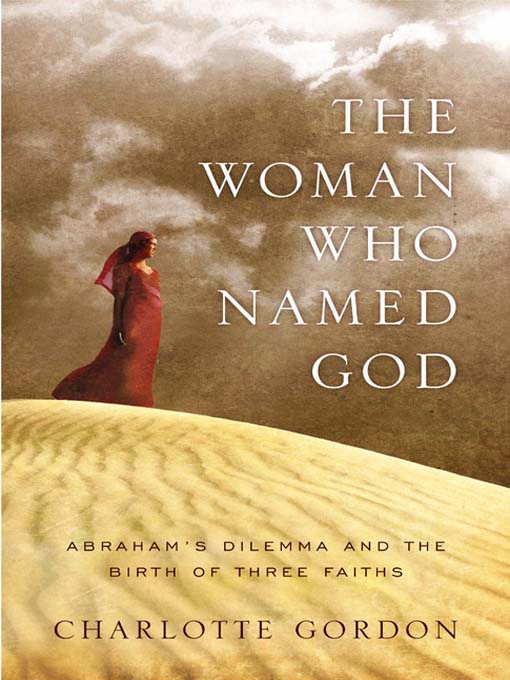
The Woman Who Named God
Abraham's Dilemma and the Birth of Three Faiths
کتاب های مرتبط
- اطلاعات
- نقد و بررسی
- دیدگاه کاربران
نقد و بررسی

June 8, 2009
The story of Abraham, Hagar and Sarah stands at the threshold of the three great Western religions—Christianity, Judaism, Islam—although each appropriates the story differently. Although God's command of Abraham to sacrifice his son, Isaac, is an oft-told story, his expulsion of his concubine, Hagar, and the son he had by her, Ishmael, is often ignored. In this sometimes provocative, though often pedestrian, rereading of the Hagar story, Gordon (Mistress Bradstreet
) gives new power to a woman often left in the shadows. Focusing on Hagar's vision of God in the desert (Genesis 16:13), Gordon argues that Hagar is a prophet and a mystic who names God El-Roi, or “the God of my seeing.” Because of her experience of God, Gordon argues, Hagar's relationship with God is one that Abraham might envy, for God offered Hagar clear and direct guidance, while God offered Abraham no clarity or guidance about his future but simply expected Abraham to obey. Although her prose is often plodding, Gordon provides some glimpses of the power of Hagar's story for modern religions.

June 1, 2009
Literary study of the story of Abraham, Sarah and Hagar.
Gordon (English/Endicott Coll.; Mistress Bradstreet: The Untold Life of America's First Poet, 2005, etc.) makes it clear that her book is not another theological or historical excavation of ancient texts."This book," she writes,"proffers an exploration of the stories that have been passed down to us as stories." Considering the texts as a set of important, intriguing stories, the author provides a refreshing viewpoint unconcerned with critical minutiae of authorship or theological reverberations. Gordon focuses on the roles of Sarah and Hagar, Abraham's wife and concubine, and mothers to two great nations. Acknowledging the short shrift given these two remarkable women, the author provides a closer examination of their roles. Gordon moves slowly, sometimes a bit laboriously, through the brief story of Abraham's life, beginning with his decision to leave his homeland and finishing with his death. Referencing passages from the Koran, the author provides readers with points of reference as to the importance of the story to all three monotheistic traditions. Gordon's major contribution is the chapter on Hagar's encounter with God in the wilderness, at which point Hagar"names" Him. The author points out that"no one had ever invented their own [name for God], and no one else ever would." She goes on to posit that Hagar's description of God as one"who sees me" is a major basis for the theology and morality of all three Abrahamic traditions. The author speculates at length on periods of"silence" in the text. Given the paucity of detail provided by scripture, much of this discussion borders on conjecture. Nonetheless, Gordon adds something new to an already full body of scholarship on Abraham.
Fresh take on an old topic.
(COPYRIGHT (2009) KIRKUS REVIEWS/NIELSEN BUSINESS MEDIA, INC. ALL RIGHTS RESERVED.)

September 1, 2009
Gordon ("Mistress Bradstreet") offers a unique look at the Old Testament relationships between and among Abraham; his wife, Sarah; and his mistress, Hagar. Gordon approaches the biblical text as a literary study as opposed to a literal divine revelation. With no theological ax to grind, she draws upon the work of theologians, scholars, archaeologists, and historians to unpack a widely misunderstood and misinterpreted saga. Most interesting is her focus on the exiled, shamed, and shadowed Hagar, whom Gordon elevates to a mystic and prophet. Gordon ultimately shows that these biblical characters are complex and multilayered; they behave, in short, like human beings who wrestle with foibles, passions, and jealousies. Most important, the story speaks to the 21st century and its marital ambivalence, dysfunctional family systems, pervasive divorce, as well as to 9/11, the so-called "Axis of Evil," and West Bank unrest. The author's vision is that the retelling of this ancient tale might awaken the world to redemption. The sons of Hagar and Sarah, after all, came together in peace at their father Abraham's funeral. General readers with even a casual interest in religion and its impact on history, as well as on current events, will appreciate the lens through which the author peers.C. Brian Smith, Arlington Heights Memorial Lib., IL
Copyright 2009 Library Journal, LLC Used with permission.

























دیدگاه کاربران